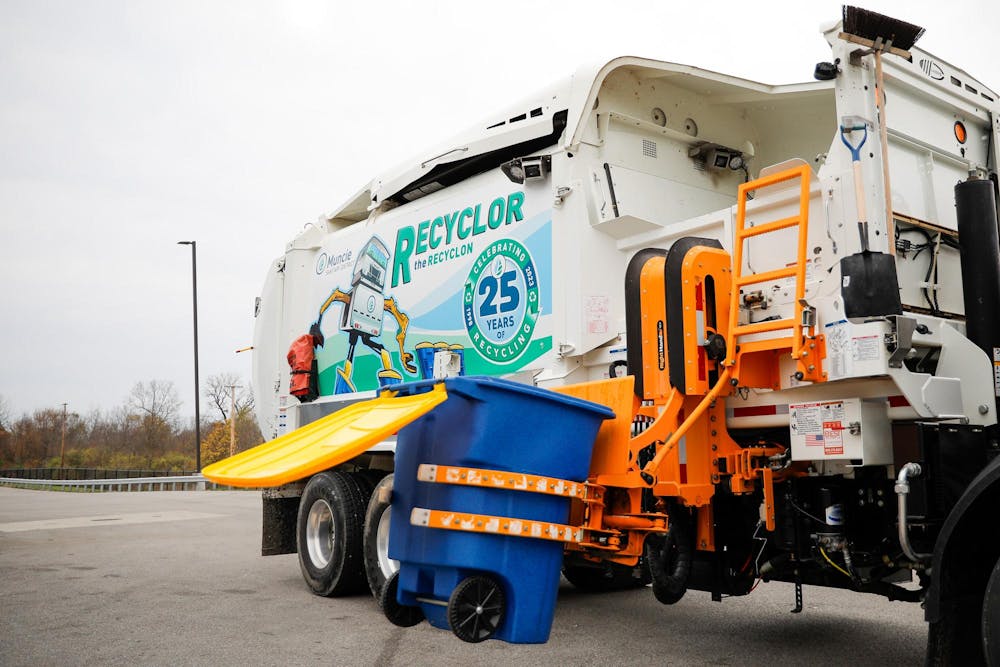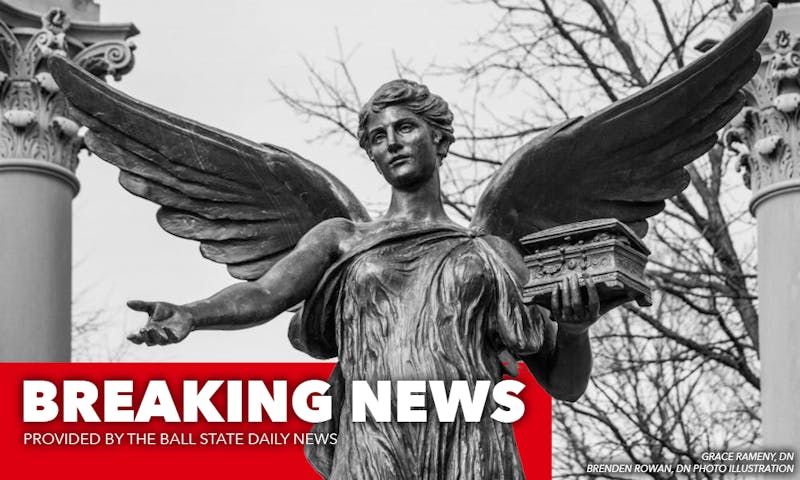The Muncie Sanitary District (MSD) has introduced a curbside recycling initiative to reduce landfill waste and increase recycling efficiency across the community.
The program, officially launched in the summer of 2023, transitions Muncie from the long-standing blue bag system to a bagless, single-stream recycling program.
With 96-gallon blue recycling toters, Jason Donati, superintendent of sanitation and recycling at the Muncie Sanitary District, said this new approach eliminates the need for recycling bags and simplifies the process for residents, helping ensure recyclables reach proper facilities without contamination.
The old program, which relied on community partners to distribute blue recycling bags, required residents to bag recyclables and place them in their trash toters for collection. These bags were removed at sorting facilities before the recyclables could be processed. Despite its contributions, the system had limitations.
After over two decades of the blue bag program, MSD began re-evaluating its effectiveness.
“We had done the blue bag program for 24 years,” Donati said. “It helped us save money [because] we were picking everything up in the same truck, but there [were] a lot of costs associated with the program.”
Those excess costs included purchasing bags, manual labor to sort through them and separating garbage from recycling.
Another issue, Donati said, was cardboard, primarily as online shopping increased.

“[People] were just throwing [boxes] in the trash or not break[ing] them down outside the toters, and we're not supposed to pick up anything that's not put in a toter,” he said.
The new 96-gallon toters allow residents to flatten cardboard and place it in the bin for collection. MSD picks up the bin once a week in a separate truck. Donati said this system helps reduce contamination in the recycling stream, which was a recurring issue with the blue bags.
The new program requires residents to actively opt-in by taking a “recycling pledge.” Participants agree to comply with MSD’s guidelines for acceptable recyclables, which include clean and dry items, such as cardboard, specific plastics, glass bottles and aluminum cans.
“Instead of just giving everybody a recycle toter, we asked people to take a pledge to learn how the program worked, sign up for it and then we would deliver it to them in phases based on when they signed up,” Donati explained.
In just over a year, more than 10,000 households signed up.
As part of the sign-up process, MSD provides participants with an 11-gallon kitchen container to help them collect recyclables before transferring them to the larger blue toters. Donati said the district also offers free paper shredding at East Central Recycling to prevent contamination.
However, rolling out a program of this scale has not been without its challenges.
“There's growing [pains] with residents who are used to bags,” Donati said. “Some of the issues we run into [are] if you've got a bunch of paper in there and it's a windy day, potentially, your toter could fall over, and there could be some loose items.”
Despite these challenges, the transition has also been met with strong support from the community. Donati said residents have been responding positively to the new system's simplicity.
“We're trying to improve every day and collect citizen feedback and try to fix any issues that come up,” Donati said.
MSD established a citizen advisory board to facilitate ongoing improvements and routinely gathers input through phone calls, emails and resident interactions during community events.
Beyond collecting feedback, MSD engages with the community through outreach programs, mainly targeting younger residents. The district recently introduced a new mascot based on its trucks, “Recyclor the Recyclon,” to promote proper recycling among children.
“One thing we kept coming back to is the kids love the trucks. They wait for those trucks to come by. Every day, the drivers honk the horns. There's something about those trucks that they love,” Donati said. “So we thought, ‘Well … why wouldn't we kind of play on that?’”

Dr. Amy Gregg, an associate professor of Environment, Geology and Natural Resources at Ball State University, emphasized the importance of these educational efforts.
“If you make [recycling] easier for people, that's always nice … giving them a way to adapt behaviors,” Gregg said. “I think sometimes people think if waste is out of sight, it’s out of mind, [but] it never really goes away. It's still in our environment, still in our community.”
In recognition of MSD’s sustainable efforts, the Indiana Department of Environmental Management (IDEM) awarded MSD the 2024 Governor’s Award for Environmental Excellence (GAEE) in the recycling category of “most prestigious environmental recognition,” according to a September press release from IDEM.
According to IDEM’s press release, MSD’s program has diverted approximately 1,436 tons, or nearly 2.9 million pounds, of recyclables from landfills in 2024.
IDEM’s External Relations Director, Natalie Rodriguez, said this data was one of the factors that set MSD’s nomination apart from the other GAEE nominations.
“Each nomination is discussed and scored by a review committee comprised of experts in their given fields. The review committee members include industry representatives, government agency directors, collegiate professors and no[t]-for-profit executives,” she said via email.
Rodriguez said MSD received a $468,798 grant from the Recycling Market Development board in 2023. This money helped purchase “one automated recycling body on a new Compressed Natural Gas Autocar chassis” and 3,500 new blue recycling toters.
IDEM’s press release included a statement from Gov. Eric Holcomb, who said, “It’s rare to have multiple awards for a single category, so I am especially proud of this year’s recipients and their dedication to bringing Indiana to the next level by creating solutions that impact the quality of life in their communities.”
MSD has set goals to improve Muncie’s waste management system further.
“We're looking to grow and looking at some potential grant opportunities that could help us eventually compost leaves and organic matter to reduce that from going to the landfill,” Donati said.
Gregg highlighted the importance of MSD’s environmental efforts, citing wildlife concerns and human health as reasons why improving waste management is essential.
“[People] don't think about impacts on wildlife or other animals. If some of those [wasteland] materials get in the river or … other places, they might fall off the truck … That can affect other parts of the environment, not just humans. It affects our health too,” she said.
As Donati and his team work to refine the system, they remain focused on a mission beyond recycling.
“Our goal is to get to 90 percent participation within five years. So, we're going to continue to push that and try to figure out how to get as many people signed up as possible,” he said.
Contact Meghan Braddy via email at meghan.braddy@bsu.edu or on X @meghan_braddy.





The Daily News welcomes thoughtful discussion on all of our stories, but please keep comments civil and on-topic. Read our full guidelines here.